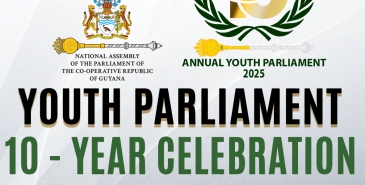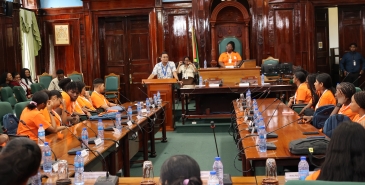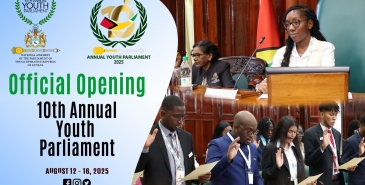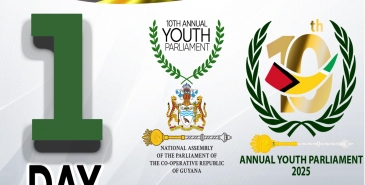Mr. Reepu Daman Persaud Order of Roraima (OR)
Speech delivered at: 24th Sitting- Tenth Parliament - 12 July, 2012
12 July, 2012
11402
Mr. Rohee: No, not at all. I have not been struck by red carpet fever Mr. Speaker. I am simply to move on behalf of the Hon. Prime Minister the motion standing in his name to honour in the National Assembly the long and exemplary service of the former Member of Parliament and Minister, Mr. Reepu Daman Persaud Order of Roraima (OR).
I believe that the motion in this regard is indeed a true reflection of the spirit and honour that should be extended to a person who has dedicated his life and work to the people of Guyana both inside these hallowed Chambers and outside as well.
It would take I believe a considerable amount of time, days, weeks perhaps , months if not years, to reflect on the life and work of Pandit Reepu Daman Persaud. But the time bound practice of what we are expected to do in the National Assembly prevents us from spending long hours in this House unless it is a matter that attracts the entire nation to such an extent that the people would wish to wonder on the matters that are holding the attention of Members of Parliament.
As we are gathered here this afternoon, I believe across the political divide the sentiments ought to be common, ought to be consensual in respect of the honour which we are about to bestow on the Hon. Former Member of this House Reepu Daman Persaud.
Maybe his father, Pandit Durga Persaud, who had a similar calling being a Pandit himself, a North Indian Brahmin and an indentured immigrant, had the foresight to name his son Reepu Daman, which means conqueror of enemies.
Let us focus on the two words just briefly – conqueror and enemies. In life it is said that we must always strive for excellence in whatever the endeavour we pursue. We all know that in striving for excellence we encounter obstacles along the way. We either shy away from those obstacles or we confront those obstacles. In studying the history of Pandit Reepu Daman Persaud it was clear that he never shied away from the obstacles that were thrown against him either by dint of his class background, his religious background, his social background, or his political background. At all times it was seen that he stood firm and confronted those challenges.
The enemy comes in various forms, hues and shapes. In every one of the categories I mentioned earlier - socially, politically, religiously - we are bound to confront an enemy at some point in time. But the question is - what is the nature of the confrontation? What is the nature of the enemy? In any event the enemy will usually reflect evil. The Gandhian adage is “non-cooperation with evil is a sacred duty.”
Mr. Speaker: Did you use it when you were on the Corentyne?
Mr. Rohee: I believethat Mr. Reepu Daman Persaud, following the leanings of his father, Pandit Durga Persaud, calmly and purposefully pursued this path in life. Born on 16th January, 1936 at Plantation Diamond, Pandit Reepu Daman Persaud was to spend most of his life, that is to say his political life, taking a resolute stand against negative forces that cast a shadow at that time over our beloved country. It was the time when Guyana was ruled by the British. British colonialism was the dominant social, political, economic and even cultural force in our country.
Any individual born in the conditions of a plantation, living in logies, would not take long to understand what challenges they must confront, and what path to life they should take. There are many in our country today who are not aware, regrettably, of the conditions under which many of our parents and fore-parents grew up in this country. Very few are aware of the conditions under which people lived in logies, the tenement yards and the type of houses that existed at that time. But as we know, reading the biographies and autobiographies of many outstanding personalities both in Guyana and the Caribbean, and reflecting what Martin Carter said about coming from the nigger yard, it does not necessarily mean that because one comes from such humble background that one would not rise to prominence in one’s country. This is precisely where we stand today in recognising the contribution made by Pandit Reepu Daman Persaud.
Childhood days brings back pleasant memories notwithstanding the conditions under which we grew up. We only have to read the biographies and the autobiographies of many of these great leaders who reflect on their childhood days and their school days to see the extent to which they enjoyed living and playing with friends, neighbours and even family. What is also equally important is the simplicity and modesty that characterised these individuals who sprung from such modest and humble beginnings. That simplicity and modesty is not only for a moment in time but for a lifetime; it takes them through their entire life.
Pandit Reepu Daman Persaud spent his early years with his sisters Mahadai and Chandroutie under the watchful eye of his widowed mother Jasodra. After his Dad had passed away they were left to fend for themselves. And in fending for themselves, the task before them, or the means to do that, was to sell vegetables at a marketplace and in the village where they grew up. The family lived not only in diamond but at Hague on the West Coast of Demerara, La Penitence and Albouystown. Note the neighbourhoods in which this family grew up – Hague on the West Coast of Demerara, La Penitence and Albouystown – all working class neighbourhoods, which by their very nature influenced the upbringing of this particular Comrade.
He attended Grove Anglican School and subsequently came to Georgetown attending Trinity High School. For those of us who are acquainted today with the Grove Anglican School – if it still exists – and with the Trinity High School, we would know from certain books published the social strata of the persons who attended those schools. In addition to attending those schools, Pandit Reepu Daman Persaud, at a very early age, took the opportunity to attend private evening classes. But like in the life of many who lived in those days -the power and influence of politics- the ferment of political life with so many champions of the struggle against colonialism, like Cheddi Jagan, Hubert Nathaniel Critchlow and others that were to come. It was in those days that Reepu Daman Persaud met with this powerful and towering figure, Mr. Cheddi Jagan, who made an immediate impression on young Reepu Daman Persaud. We are told that in 1953, three years after the People’s Progressive Party was established in 1950 Jagan was speaking at a public meeting in Grove at which young Persaud was present. He heeded the call by Dr. Jagan to assist in the elections campaign which was at that time growing and developing a momentum. I understand that young Persaud made a comment to his friends who were standing with him listening to what was said at the meeting – as was common in those days. He made a joke to his friends when he said that one day he will come to this very village and speak like Jagan. Little did he know that years after such a pronouncement was to come to pass. He was a mere 17-year old at that time. He threw himself wholeheartedly with gusto and zest, full of energy, into the political struggles only to find himself becoming a candidate for the same area in which he grew up on 17th December, 1964. In those days there were constituencies, and young Persaud defeated the PNC candidate Mr. John Fernandes who had come from the upper strata of society. This again was another manifestation of how the struggles were unfolding because here was a man coming from a working class background, here was a man coming from a village that was dominated by working class ferment and politics. Because the people in the country were identifying with that type of struggle it was only natural that they would throw their weight behind a person who was associated with that type of struggle. John Fernandes came from the property class, the class that worked hand in glove with the British. In the anti-colonial struggle the Guyanese people, united at that time against racial and political lines, wanted to get rid of the property and plantation classes. It was in the vortex of that struggle that Mr. Persaud found himself being triumphant against Mr. Fernandes. But the ways of politics is very interesting. Mr. Fernandes whom we were told is a “likeable fellow”, congratulated Mr. Persaud on his victory without any venom or bitterness. He expressed encouraging words to the young man after hearing him speak publicly telling him that he had a bright future in politics.
Young Reepu Daman Persaud wrote that the subjects he used to study were British History, Constitution and Economics. We are told that he loved those subjects. But continuing in the same line as I have been portraying Mr. Persaud thus far - with so many young people, with so many families affected as a result of economic deprivation and not having the necessary resources - he was unable to pursue his most cherished dream which was to become a lawyer. But Mr. Persaud, undaunted as he is today, channeled his efforts in a closely associated field becoming eventually a lawyer’s clerk. He is quoted as saying that law fascinated him and applied his mind. People around him said he had the flair to become a good lawyer. In fact he became very popular among his fellow law clerks and even became the Vice President of the newly formed Law Clerks Association. From the vice presidency he moved to the presidency of that Association. Interesting enough, in a strange twist of events, he was called upon to lead a delegation of the Association to meet with Mr. Forbes Burnham. After the presentation we are told that Mr. Burnham, who at the time was at Clerk and Martin, told young Persaud that he was very impressed with the presentation he made. It was the years he spent as a law clerk that put him in good stead to become one of the best Members of Parliament this House has ever seen.
While a Member of Parliament he was a shadow Minister for Legal Affairs, and though not a lawyer he represented his portfolio well. He spoke on legal issues during the times of Sunny Ramphal, Fred Wills and Keith Messiah. In fact I have seen letters of commendation from Dr. Mohammed Shahabuddeen to Mr. Persaud.
Those of us who were youngsters in the days when Mr. Persaud was very active in this Parliament, many of us who sat in these very Chambers, would know that he was blessed with an eloquent and articulate manner of speech. Being a Pandit, of course, like every pastor, they are usually blessed with those talents. And he used this gift as a Pandit, as a politician, as a Minister, and President of the Guyana Hindu Dharmic Sabha.
Even in his early days the record would show he would drive around in a motor car with a loud speaker/hailer at the top announcing films that would be shown in the various movie houses on the East Bank. He had a short stint in this respect and even became the manager of a cinema, subsequently becoming a taxi driver and then President of the Hire Care Association – all lowly beginnings.
In 1959 he was elected the General Secretary of the Sanatan Dharma Maha Sabha after many years of helping to strengthen and organise that body. In 1965, the 18th May, he was elected as a Member of the National Assembly at the age of 28 and he spoke many times in this House. During those days Mr. Persaud spoke on 56 Bills, 33 Motions between 1965 and 2006. He participated in 37 budget debates in these Chambers.
I have with me some excerpts from the Hansard which reflects the wide range of subjects on which this comrade spoke. He spoke for example on public security when in 1966 speaking on the release of the detainees from City Hall he said:
“We see from the terms of reference of the tribunal which was set up that all you can do is listen to a person for a whole day and when they are finished they can make a recommendation to the governor who will have the right to say whether or not he will accept the recommendation of the tribunal. Could this be fair? Is this justice? Further, when one examines the legal process one finds very clearly written that a delay of justice is a denial of justice. Such are the principles and maxims of justice. Today in British Guyana I make bold to say that there is no such thing as justice, freedom is restricted, and if this government continues in this way then in a short period in British Guyana we will have complete dictatorship with wholesale suppression of freedom of expression.”
That was said in the National Assembly in 1966.
On the question of culture, a debate took place in the National Assembly on the question of the Coat-of-Arms for an independent Guyana and this is what Mr. Persaud had to say on the 25th of February, 1966 when discussing what the Coat-of-Arms should be, he said that:-
“We should enter into independence with the minimum of disputes.”
He said that:
“We were asked to accept in this House, sometime ago, a National Anthem approved by the National History and Arts Council.”
From the explanation given by the Hon. Member, Mr. Benn and his presentation of tangible proof in the form of a stuffed Canje Pheasant. In other words, the Speaker ruled that the Canje Pheasant be brought into the House so they can see exactly how this stuffed Canje Pheasant ought to reflect itself on the Coat-of-Arms of an independent Guyana. The stuffed Canje Pheasant, having been seen in the House, he said is clear evidence of the fact that the National History and Arts Council is not a competent body to deal with matters of this nature.
So that even on the question of the Coat-of-Arms, in these very Chambers, which we are seated in right now, a debate took place to settle what we now have inherited as the Coat-of-Arms of Guyana. Mr. Persaud was very descriptive in his presentation on this matter. This is what he had to say:
“The Coat-of-Arms had been criticised in detail, but when one looks at the Lotus, which is depicted, it will be seen that this is really a disgrace of art. I have seen school children drawing better than this. It is no credit to the persons who prepared it. The part that is supposed to depict the rice looks like blackeyed peas, perhaps the Minister wants blackeyed peas to be on this in order to confuse the residents at Black Bush Polder.”
He says that:
“The Canje Pheasant is a false bird; a false stem. And according to Mr. Stoby, the Jaguar resembles lions.”
I mentioned those just to give a snap shot of what Mr. Persaud was capable of speaking to during the debates in the National Assembly.
There were serious divisions in the Hindu communities in the 60’s. In 1969, he left the Maha Sabha because of the serious political divisions that took place in that organisation. He was thrown out of the organisation because of his refusal to support the People’s National Congress (PNC) and Mr. Forbes Burnham. He was badly beaten, locked up and treated heinously, especially in the Essequibo Coast. Hundreds of people from Essequibo had turned out to support him. Pandit Persaud received from the Hindus across Guyana, who were responsive to his tireless crusade of promoting Hinduism and culture and he was usually the target of many violent acts. Many stood at his side through those dark days when he fought for their rights and solved their problems at a personal cost.
Mr. Persaud joined the People’s Progressive Party (PPP) at a very early age and many would ask the question, for us to explain how could a religious leader, a pandit, belong to a party known as a communist party? How are these two reconcilably for a religious leader, as was then described of the PPP, being a communist party? But, this is simply because this inability to understand the nature of the People’s Progressive Party; the nature of the principles of the People’s Progress Party; the nature of the philosophy of the People’s Progressive Party that led to this serious ideological and philosophical distortions of how a “communist party” could have religious leaders of the type of Reepu Daman Persaud playing a leading role at all times and even up to now in the organisation. This is what has baffled the enemy. The enemy that I spoke about earlier, that comes in various shapes, forms and use. The People’s Progressive Party has never ask Mr. Persaud to denounce his religious beliefs; to remove himself from his religious beliefs, because there was always the accommodation for persons with religious persuasions to belong to and be active in the People’s Progressive Party.
Pandit Persaud is the founder and President of the Hindu Dharmic Sabha, which was established in 1974. He has served this organisation for 38 years and continues in this capacity up to this day. Many, who could not reconcile their political with the religious beliefs, fled this country during the days of the dictatorship and went to seek their fortunes in other lands. Mr. Reepu Daman Persaud remained steadfast and never left the shores of this country to seek his fortunes in other lands.
Mr. Persaud has served under the Presidency of Cheddie Jagan, Janet Jagan, Bharrat Jagdeo and now of Donald Ramotar. So while we declared at one time, “there was no place for Donald”; while we made the hallow claim that, “there was no place for Donald”; a part from him now acceding to the Presidency, there is a place for Reepu Daman Persaud. This Comrade has a wealth of experience and knowledge and is still very sharp in his thinking; still contributing to the leadership of the People’s Progressive Party. His sobering and calm temperament has always been useful in the leadership of the party and in the Cabinet.
He is the proud father of six children, two sons and four daughters and a grandfather of two beautiful granddaughters. Pandit Reepu Daman Persaud is married to Indranie, who has been a tower of strength and support with every step that he took.
He continues to live by the motto which he adopted from the Bhagavad Gita for the Hindu Dharmic Sabha:
“Action thy duty, reward not thy concern.”
In conclusion, the son of a humble indentured immigrant from India, Reepu Daman Persaud has made an indelible impact in all the struggles of this country and can be best known as a noble Guyanese son and patriot who has helped to bring our country to where it is today.
Thank you Mr. Speaker. [Applause]
Speech delivered by:
What's New

17 August, 2025
10th Annual Youth Parliament Closes: Celebrating a Decade of Impact, Excellence, and Youth Empowerment10th Annual Youth Parliament Closes: Celebrating a Decade of Impact, Excellence, and Youth Empower

13 August, 2025
Youth Parliamentarians Assemble for Grand Rehearsals for the 10th Annual Youth Parliament

12 August, 2025
10th Annual Youth Parliament Kicks Off – Young Voices, Bold Ideas, Bright Futures!

11 August, 2025
10th Annual Parliament Kicks off tomorrow

